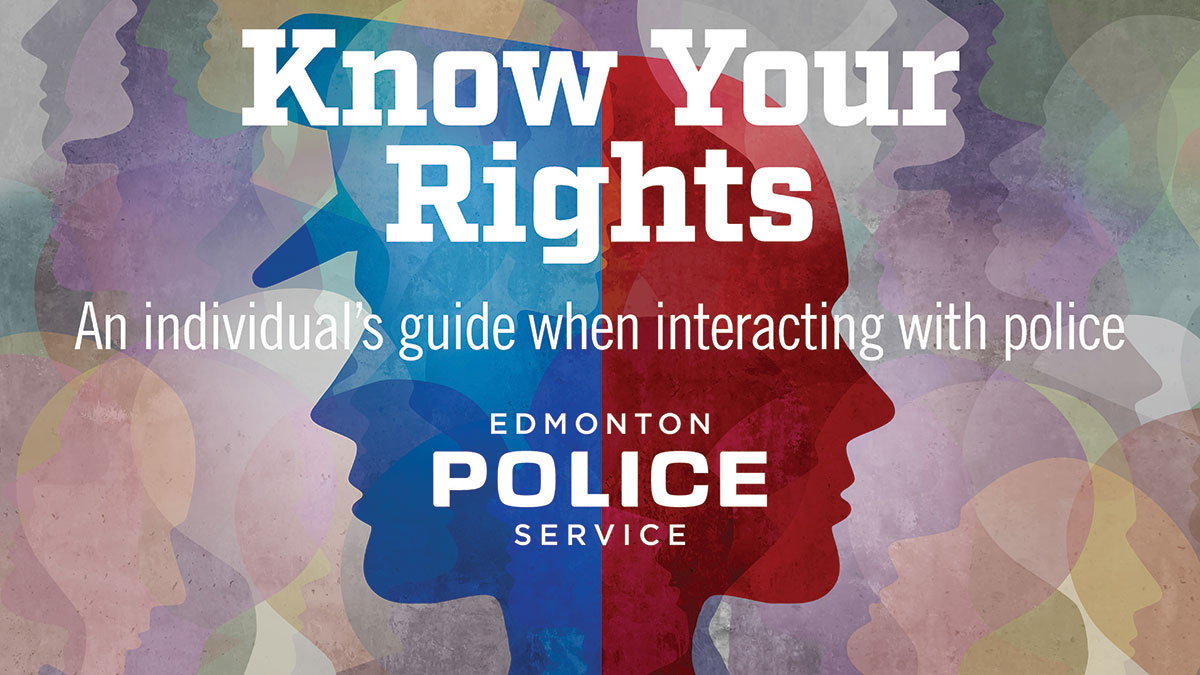
Download the English version here.
EPS Officer Responsibilities and Public Rights
Crime prevention is essential to the maintenance of public safety. The role of the Edmonton Police Service (EPS) is to protect life and property, maintain public peace, and prevent, detect and solve crimes. Where the EPS is unable to prevent crime in partnership with the community, our goal becomes to investigate it.
Everyone has the right to feel safe. The foundation of police legitimacy is the public’s trust in police and without trust police are ineffective and cannot do their jobs. The EPS needs to understand neighbourhood problems and work closely with the community to prevent crimes from occurring, with the goal of improving the lives of everyone in Edmonton.
Conversations between a person and a police officer are important because they give the EPS information that can help solve and prevent crimes. When faced with a police interaction, a person is generally free to leave and continue on their way. This does not prevent a police officer from trying to speak with a person, but a person is always free to leave unless the police officer has a reason to arrest or detain them.
EPS police officers need to engage with members of the public if they are to learn about the communities they serve. This usually involves approaching a person and starting a conversation. EPS police officers are trained to follow policies that strive to ensure fair and impartial policing. For example, an
officer contact report can only be conducted if there are clear grounds that it may further an investigation or prevent crime, disorder and victimization.
It’s important to know what your rights are, as well as what an EPS officer’s roles and responsibilities are when you’re interacting with them. The following is designed to provide you with general information about what an officer must do, what you do not have to do, and what you may wish to do in situations involving the police.
When an EPS officer stops or approaches you to speak with you, they must:
- Identify themselves.
- Tell you why you have been stopped or why they want to talk to you.
- If you are arrested or detained, tell you what for.
- Advise you that you can talk to a lawyer if you are under arrest and provide you with an opportunity to do so in privacy and safety.
- Let you be on your way if you are not being arrested or detained.
- Give you a copy of a search warrant if it authorizes them to search you or your home.
- Act reasonably and respectfully during a search.
- Not use excessive force or damage your property without reason.
- Return your property to you within three months if your property was seized as part of a search and you have not been charged with an offence. When an investigation takes longer than 3 months, a police officer needs permission from a Judge to keep your property for longer than 3 months.
When you are stopped or approached by an EPS officer, you:
- Do not need to answer the questions of a police officer. Any information you share is voluntary.
- Are required to identify yourself if you are breaking a law – including municipal bylaws and provincial laws that require a ticket be issued – or are under arrest.
- Can generally say, “No.”, when police ask to search your belongings unless you are under arrest or being detained with safety concerns.
- May leave unless you are being detained or arrested.
- If you are arrested or detained, you have a right to speak with a lawyer as soon as officers can give you the privacy and safety to do so in your circumstances.
- Have a right to know a police officer’s name or badge number.
- Are not required to give them access to your home unless they have a warrant or have an urgent reason to enter your home.
- Can ask to see a copy of a search warrant that authorizes police to enter your home.
- Are required to provide your driver’s licence, car registration and insurance if you are stopped while driving.
- Do not generally have a right to speak to a lawyer before taking a roadside breath test.
- Can report a police officer to the Chief of Police or Edmonton Police Commission if you have been abused, treated unfairly, or had your rights violated.
This information is intended to provide general information on the interactions of a person and a police officer. It is not a complete description of all of a person’s rights. This information does not replace the advice of a lawyer, who can give you advice specific to you and your situation. You should consult a lawyer for advice on your situation. If you are arrested, a police officer will read you your rights and give you a toll-free number for free legal advice as well as other resources you might find helpful.
Click here for a list of some of the independent resources available for you to connect with a lawyer.